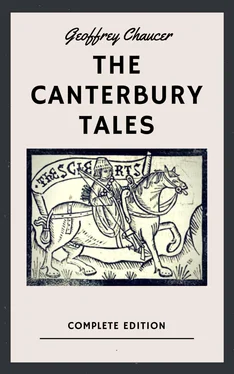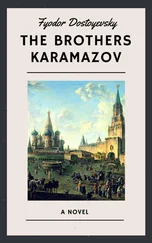Then would he speake no word but Latin.
A fewe termes knew he, two or three,
That he had learned out of some decree;
No wonder is, he heard it all the day.
And eke ye knowen well, how that a jay
Can clepen* "Wat," as well as can the Pope. *call
But whoso would in other thing him grope*, *search
Then had he spent all his philosophy,
Aye, Questio quid juris,<51> would he cry.
He was a gentle harlot* and a kind; *a low fellow<52>
A better fellow should a man not find.
He woulde suffer, for a quart of wine,
A good fellow to have his concubine
A twelvemonth, and excuse him at the full.
Full privily a *finch eke could he pull*. *"fleece" a man*
And if he found owhere* a good fellaw, *anywhere
He woulde teache him to have none awe
In such a case of the archdeacon's curse;
*But if* a manne's soul were in his purse; *unless*
For in his purse he should y-punished be.
"Purse is the archedeacon's hell," said he.
But well I wot, he lied right indeed:
Of cursing ought each guilty man to dread,
For curse will slay right as assoiling* saveth; *absolving
And also 'ware him of a significavit<53>.
In danger had he at his owen guise
The younge girles of the diocese, <54>
And knew their counsel, and was of their rede*. *counsel
A garland had he set upon his head,
As great as it were for an alestake*: *The post of an alehouse sign
A buckler had he made him of a cake.
With him there rode a gentle PARDONERE <55>
Of Ronceval, his friend and his compere,
That straight was comen from the court of Rome.
Full loud he sang, "Come hither, love, to me"
This Sompnour *bare to him a stiff burdoun*, *sang the bass*
Was never trump of half so great a soun'.
This Pardoner had hair as yellow as wax,
But smooth it hung, as doth a strike* of flax: *strip
By ounces hung his lockes that he had,
And therewith he his shoulders oversprad.
Full thin it lay, by culpons* one and one, *locks, shreds
But hood for jollity, he weared none,
For it was trussed up in his wallet.
Him thought he rode all of the *newe get*, *latest fashion*<56>
Dishevel, save his cap, he rode all bare.
Such glaring eyen had he, as an hare.
A vernicle* had he sew'd upon his cap. *image of Christ <57>
His wallet lay before him in his lap,
Bretful* of pardon come from Rome all hot. *brimful
A voice he had as small as hath a goat.
No beard had he, nor ever one should have.
As smooth it was as it were new y-shave;
I trow he were a gelding or a mare.
But of his craft, from Berwick unto Ware,
Ne was there such another pardonere.
For in his mail* he had a pillowbere**, *bag <58> **pillowcase
Which, as he saide, was our Lady's veil:
He said, he had a gobbet* of the sail *piece
That Sainte Peter had, when that he went
Upon the sea, till Jesus Christ him hent*. *took hold of
He had a cross of latoun* full of stones, *copper
And in a glass he hadde pigge's bones.
But with these relics, whenne that he fond
A poore parson dwelling upon lond,
Upon a day he got him more money
Than that the parson got in moneths tway;
And thus with feigned flattering and japes*, *jests
He made the parson and the people his apes.
But truely to tellen at the last,
He was in church a noble ecclesiast.
Well could he read a lesson or a story,
But alderbest* he sang an offertory: *best of all
For well he wiste, when that song was sung,
He muste preach, and well afile* his tongue, *polish
To winne silver, as he right well could:
Therefore he sang full merrily and loud.
Now have I told you shortly in a clause
Th' estate, th' array, the number, and eke the cause
Why that assembled was this company
In Southwark at this gentle hostelry,
That highte the Tabard, fast by the Bell.<59>
But now is time to you for to tell
*How that we baren us that ilke night*, *what we did that same night*
When we were in that hostelry alight.
And after will I tell of our voyage,
And all the remnant of our pilgrimage.
But first I pray you of your courtesy,
That ye *arette it not my villainy*, *count it not rudeness in me*
Though that I plainly speak in this mattere.
To tellen you their wordes and their cheer;
Not though I speak their wordes properly.
For this ye knowen all so well as I,
Whoso shall tell a tale after a man,
He must rehearse, as nigh as ever he can,
Every word, if it be in his charge,
*All speak he* ne'er so rudely and so large; *let him speak*
Or elles he must tell his tale untrue,
Or feigne things, or finde wordes new.
He may not spare, although he were his brother;
He must as well say one word as another.
Christ spake Himself full broad in Holy Writ,
And well ye wot no villainy is it.
Eke Plato saith, whoso that can him read,
The wordes must be cousin to the deed.
Also I pray you to forgive it me,
*All have I* not set folk in their degree, *although I have*
Here in this tale, as that they shoulden stand:
My wit is short, ye may well understand.
Great cheere made our Host us every one,
And to the supper set he us anon:
And served us with victual of the best.
Strong was the wine, and well to drink us lest*. *pleased
A seemly man Our Hoste was withal
For to have been a marshal in an hall.
A large man he was with eyen steep*, *deep-set.
A fairer burgess is there none in Cheap<60>:
Bold of his speech, and wise and well y-taught,
And of manhoode lacked him right naught.
Eke thereto was he right a merry man,
And after supper playen he began,
And spake of mirth amonges other things,
When that we hadde made our reckonings;
And saide thus; "Now, lordinges, truly
Ye be to me welcome right heartily:
For by my troth, if that I shall not lie,
I saw not this year such a company
At once in this herberow*, am is now. *inn <61>
Fain would I do you mirth, an* I wist* how. *if I knew*
And of a mirth I am right now bethought.
To do you ease*, and it shall coste nought. *pleasure
Ye go to Canterbury; God you speed,
The blissful Martyr *quite you your meed*; *grant you what
And well I wot, as ye go by the way, you deserve*
Ye *shapen you* to talken and to play: *intend to*
For truely comfort nor mirth is none
To ride by the way as dumb as stone:
And therefore would I make you disport,
As I said erst, and do you some comfort.
And if you liketh all by one assent
Now for to standen at my judgement,
And for to worken as I shall you say
To-morrow, when ye riden on the way,
Now by my father's soule that is dead,
*But ye be merry, smiteth off* mine head. *unless you are merry,
Hold up your hands withoute more speech. smite off my head*
Our counsel was not longe for to seech*: *seek
Us thought it was not worth to *make it wise*, *discuss it at length*
And granted him withoute more avise*, *consideration
And bade him say his verdict, as him lest.
Lordings (quoth he), now hearken for the best;
But take it not, I pray you, in disdain;
This is the point, to speak it plat* and plain. *flat
That each of you, to shorten with your way
In this voyage, shall tellen tales tway,
To Canterbury-ward, I mean it so,
And homeward he shall tellen other two,
Of aventures that whilom have befall.
And which of you that bear'th him best of all,
Читать дальше












